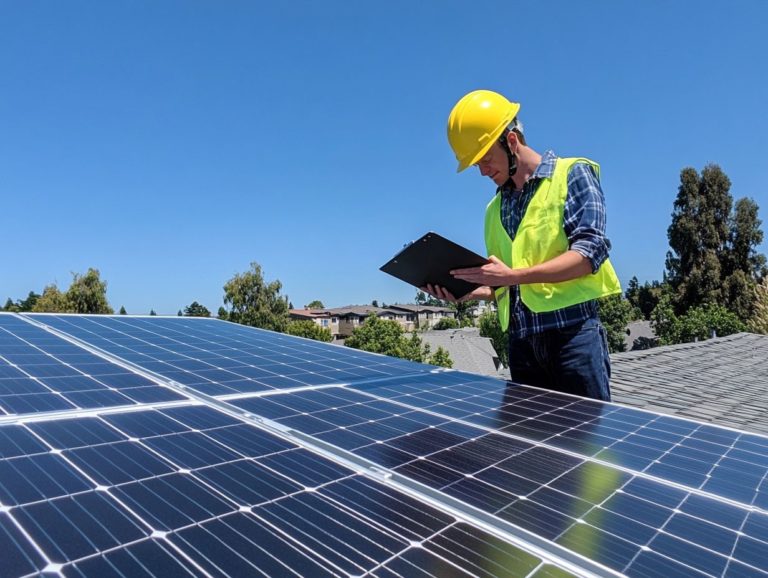What are the Basics of Energy Performance Certificates?
Energy Performance Certificates (EPCs) are vital in today s real estate market. They offer key insights into a property s energy efficiency and environmental impact, especially when considering energy consumption and compliance with building regulations.
As a property owner aiming to enhance your home or a buyer evaluating potential investments, grasping the intricacies of EPCs and energy efficiency certificates is essential.
This guide will illuminate what an Energy Performance Certificate (EPC) is, its significance in buildings, the calculation process, the specifics of an EPC report, and how to acquire one.
Uncover the advantages of being well-versed in EPCs and how they relate to energy performance ratings!
Contents
Key Takeaways:
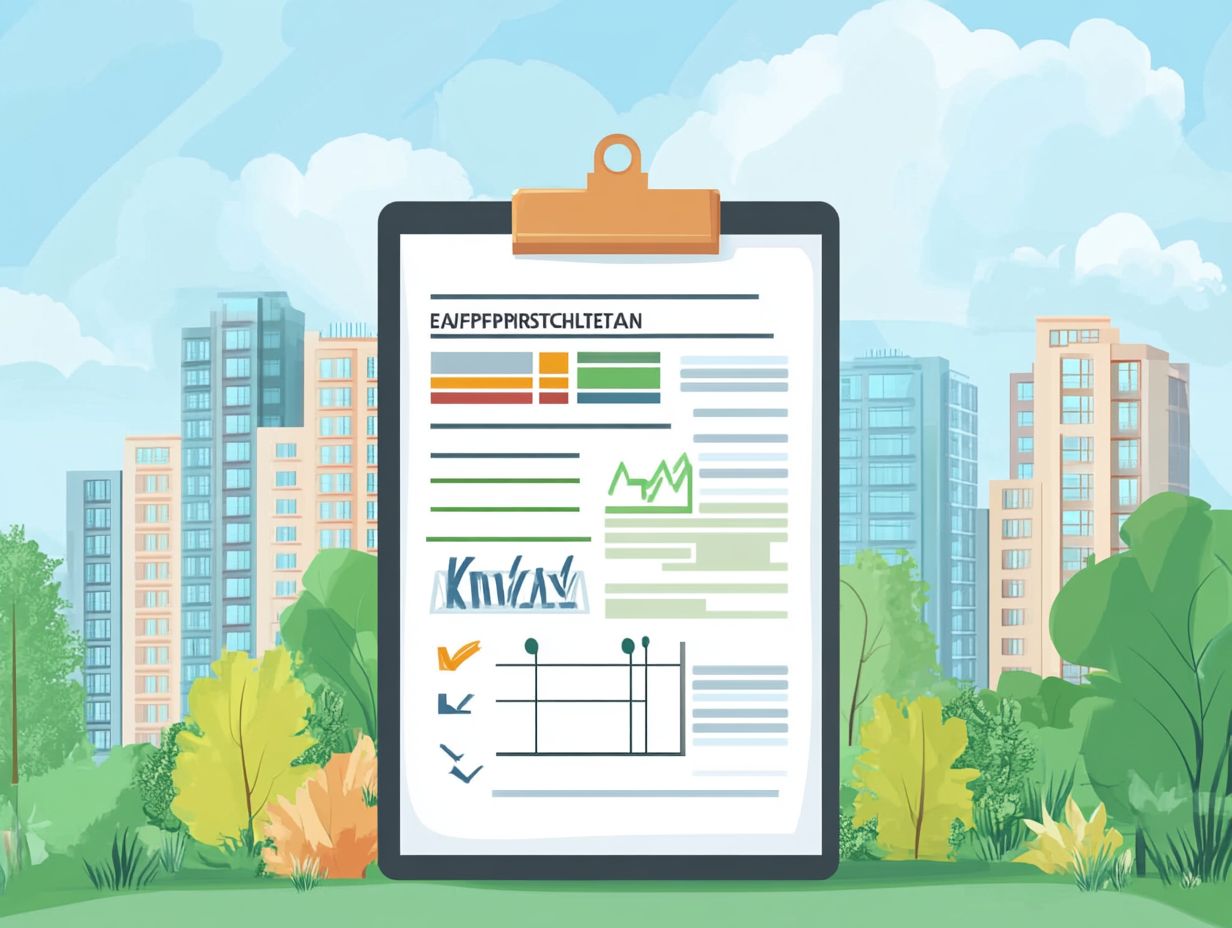
- An Energy Performance Certificate (EPC) is a report that assesses the energy efficiency and environmental impact of a property. It incorporates factors like energy consumption and CO2 emissions to provide information to potential buyers and tenants.
- Obtaining an EPC is important for property owners and buyers, as it helps identify potential energy savings and improve the overall sustainability of the property through recommendations for improvement.
- EPC ratings are calculated based on various factors and methods. The report includes a breakdown of the property’s energy efficiency, environmental impact, and recommendations for enhancement.
What is an Energy Performance Certificate (EPC)?
An Energy Performance Certificate (EPC) is an essential document that delivers an energy performance rating for buildings, showcasing their energy efficiency and environmental impact. This certificate is designed to help you, whether you’re a property owner or a potential buyer, understand just how energy-efficient a property truly is. It provides a standardized approach to assessing energy consumption.
Issued by certified professionals trained to evaluate energy efficiency in homes, the EPC not only outlines recommendations for improvements but also highlights the potential energy costs linked to the property. This valuable information aids you in making informed decisions during real estate transactions across various regions, including the United Kingdom and the European Union.
Explanation and Purpose
The Energy Performance Certificate (EPC) is designed to offer you a clear overview of a property’s energy efficiency. It empowers you to make informed decisions about energy consumption and potential enhancements through energy assessments.
By presenting crucial data on energy use and associated costs, the EPC becomes an invaluable asset for property owners like you. It enables an effective assessment of your environmental impact and draws attention to areas where you can enhance energy efficiency. This guides you toward necessary upgrades or improvements that not only have the potential to reduce your energy bills but also contribute to broader sustainability initiatives.
The EPC helps you prioritize investments in energy-efficient solutions, such as solar panels. This ensures alignment with regulatory requirements while fostering greater awareness of the benefits tied to a greener living environment.
Why is an EPC Important?
The Energy Performance Certificate (EPC) is crucial for anyone looking to boost their property’s value and sustainability! It plays a significant role in fostering energy efficiency and transparency within property transactions, especially in the United Kingdom and the European Union.
By offering an energy performance rating, the EPC gives you the property owner or prospective buyer the ability to grasp energy consumption levels that can substantially affect both energy costs and environmental impact. It helps measure energy performance effectively.
In the UK and EU, a valid EPC is often required for selling or renting properties. This makes it an essential asset for anyone engaged in the real estate market.
Ready to assess your property s energy efficiency? Get your EPC today!
Benefits for Property Owners and Buyers
Energy Performance Certificates (EPCs) provide many advantages for property owners and buyers. They allow you to evaluate energy efficiency and make informed decisions that could lead to significant savings on your energy bills.
Possessing an EPC can enhance the value of your property, as energy-efficient homes are increasingly coveted in today’s real estate market. It’s essential to meet legal requirements for rentals and sales, and having a valid EPC ensures adherence to energy regulations. For more information on this topic, check out our guide on how to evaluate energy performance in homes, helping you avoid potential fines.
Moreover, properties with higher energy ratings attract environmentally conscious buyers who prioritize sustainability and lower carbon footprints. Investing in an EPC not only makes good financial sense but also aligns you with a more responsible way of living.
How is an EPC Calculated?
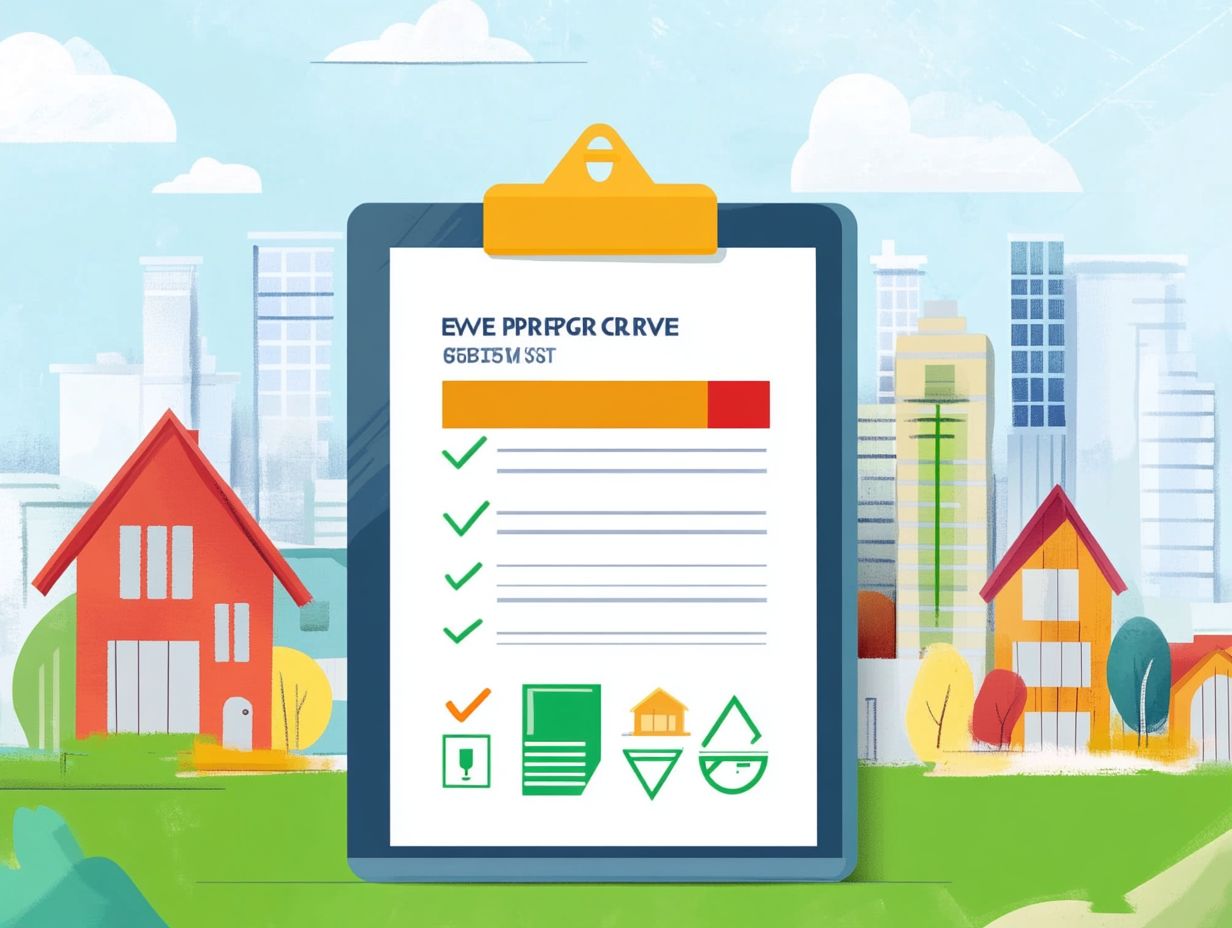
Calculating an Energy Performance Certificate (EPC) involves a careful review of several factors and standardized methods, such as energy assessments, ensuring a precise representation of a building’s energy efficiency.
An energy assessment involves examining the property’s heating systems, insulation, and renewable energy options. Typically, you start with an energy assessment that thoroughly examines various components of the property, including heating systems, insulation, and the potential integration of renewable energy sources like solar panels.
By adhering to specific building regulations and guidelines, the EPC delivers a comprehensive energy performance rating that accurately reflects the actual energy consumption and efficiency of the property, helping to promote green initiatives.
Factors and Methods Used
Calculating an EPC requires you to assess various factors and use standardized methods that take into account your building s design, insulation, heating systems, and energy systems.
Key aspects to consider include the quality of insulation materials, which are vital for maintaining energy efficiency and reducing heat loss. You ll also need to evaluate the performance of heating systems whether they re traditional boilers or modern heat pumps to determine how effectively they provide warmth while minimizing energy use.
The calculation process examines energy consumption patterns, shedding light on how different occupants utilize energy over time. You can gather data through energy bills or real-time monitoring, enabling a thorough evaluation that ultimately informs recommendations for improvement.
What is Included in an EPC Report?
An Energy Performance Certificate (EPC) report provides a detailed overview of a property’s energy efficiency and performance rating. This report typically features essential elements, such as the energy rating itself, usually presented on a scale from A to G, along with tailored recommendations for boosting energy efficiency.
The EPC report might uncover potential energy consumption patterns, CO2 emissions, and the overall environmental impact of the property. This makes it a critical resource for both property owners and prospective buyers, guiding informed decisions about energy use and sustainability.
Components and Ratings
The components of an EPC report encompass various ratings that reflect your building’s energy efficiency, allowing you to grasp its performance fully and measure energy performance in line with energy regulations.
These ratings paint a clear picture of how much energy your property consumes in comparison to others within the same category. By examining the accompanying recommendations for improvement, you can pinpoint effective measures to enhance energy use think upgrading insulation or installing energy-efficient appliances.
These ratings inform potential buyers or tenants about your property’s overall sustainability and play a role in advancing broader environmental goals by promoting energy conservation. Understanding these factors is crucial for anyone involved in real estate or property management, as they can significantly sway investment decisions and operational costs.
How to Obtain an EPC
Obtaining an Energy Performance Certificate (EPC) is a straightforward process that usually requires the expertise of a certified energy expert. Your journey begins by scheduling an energy assessment, during which the assessor will evaluate your property s energy performance and efficiency measures.
After the assessment, you may notice that the costs of obtaining an EPC vary based on the size and complexity of your property. However, the insights gained are invaluable; they can significantly influence your decisions regarding energy improvements and your overall environmental impact, especially when considering the basics of renewable energy certification.
Steps to Obtain an EPC and Associated Costs
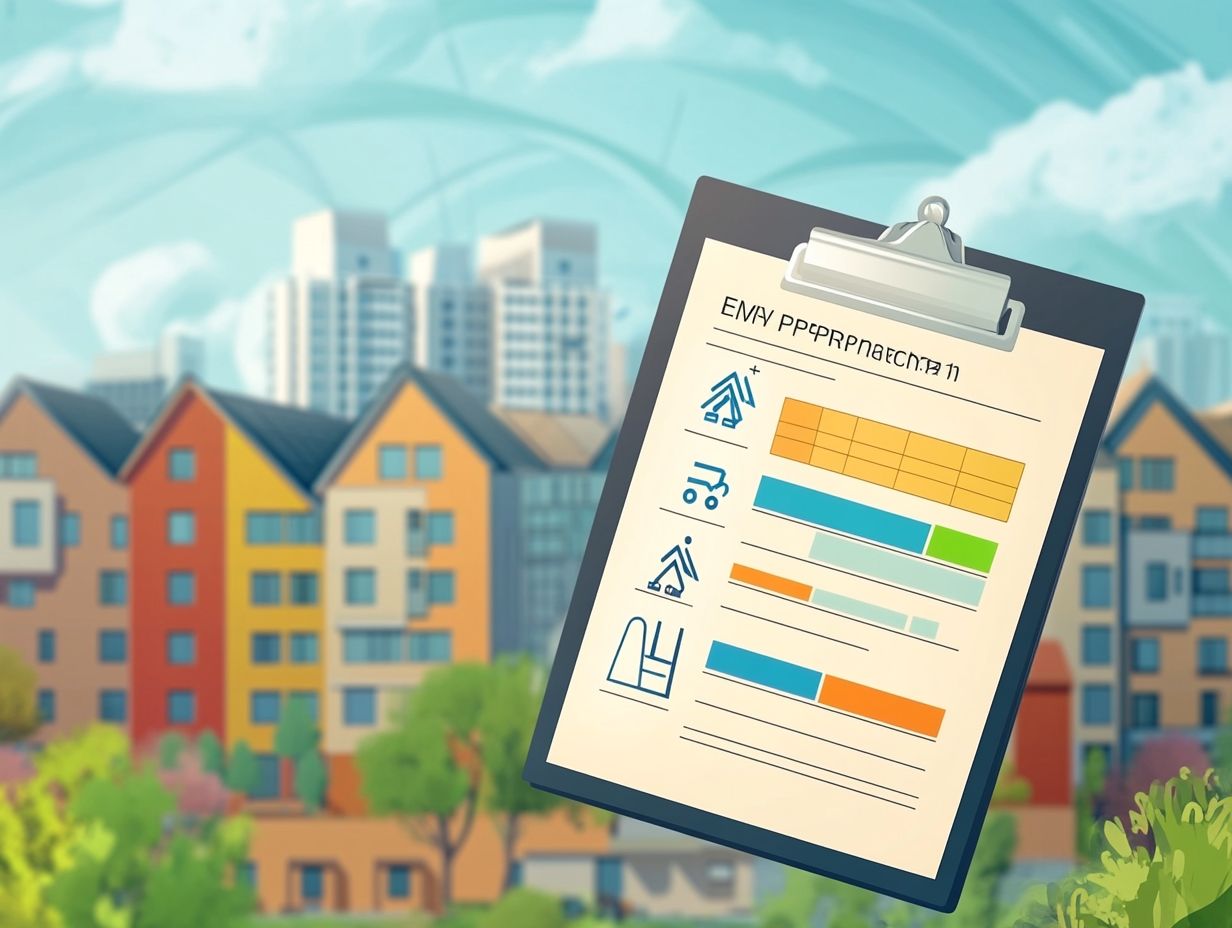
The journey to obtaining an EPC typically starts with locating a certified energy expert who will carry out a comprehensive property assessment.
Once you’ve found a suitable assessor, they will arrange a visit to evaluate your property’s energy efficiency. This process involves a meticulous examination of insulation, heating systems, and overall energy usage. The assessment can take anywhere from 30 minutes to a few hours, depending on the size and complexity of your property.
As for the costs, they can vary widely, usually falling between 50 and 120. Factors influencing this range include the type of property whether it’s a flat, house, or commercial building and its location, with urban areas often reflecting different pricing structures than rural ones. These variables impact the cost and can also affect the availability of qualified assessors in your area.
Understanding EPC Ratings
Understanding EPC ratings is essential for you as a property owner or potential buyer. These ratings offer valuable insights into the energy efficiency and environmental impact of buildings.
Typically, EPC ratings range from A to G where A signifies the highest level of energy efficiency and G indicates the lowest. By grasping these ratings, you can make better decisions about energy consumption, consider potential upgrades, and evaluate the overall sustainability of properties.
Managing energy costs also addresses the urgent need to reduce CO2 emissions.
Interpreting the Energy Efficiency and Environmental Impact Ratings
Interpreting the energy efficiency and environmental impact ratings from an EPC is crucial for grasping a property’s overall energy performance.
These ratings are essential for buyers and homeowners alike, providing key insights into how energy-efficient a property is and highlighting areas that may need improvement. For example, a high rating usually indicates lower energy costs and a smaller carbon footprint, while a lower rating might suggest that upgrades like enhanced insulation or more efficient heating systems are in order.
By understanding these scores, you empower yourself to make informed decisions about necessary renovations and shape your energy consumption choices, ultimately boosting both your property’s value and its sustainability.
Frequently Asked Questions
Let s answer some common questions about EPCs!
What are Energy Performance Certificates (EPCs)?
EPCs are documents that provide information about the energy efficiency of a property. They are legally required for all properties that are being sold, rented, or built in the UK.
How are EPCs calculated?
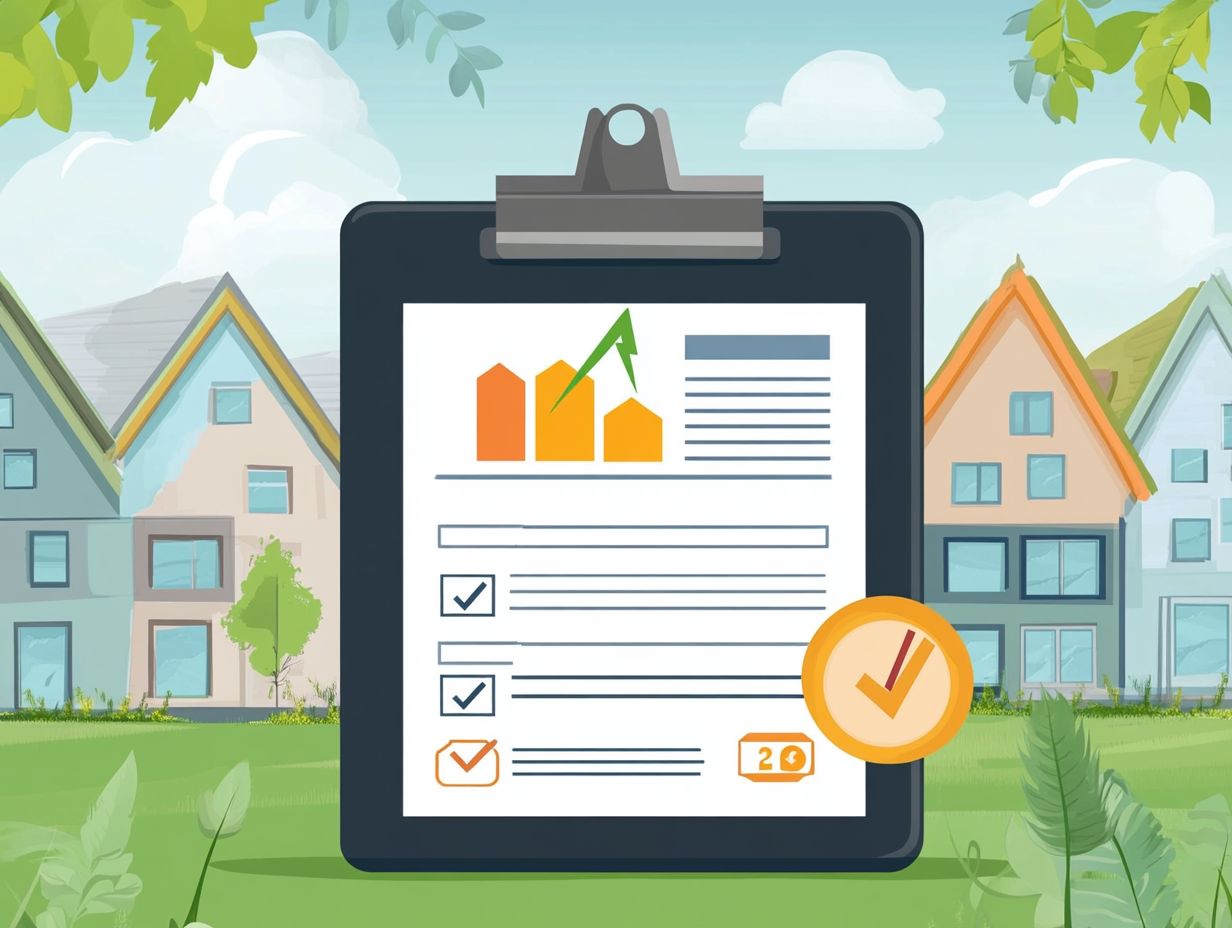
EPCs are calculated using standardized methods and take into account factors such as the construction of the property, heating and cooling systems, insulation, and lighting. The final rating is shown on a scale from A (most efficient) to G (least efficient).
Who is responsible for obtaining an EPC?
The responsibility for obtaining an EPC falls on the seller or landlord of the property. However, they can also be obtained by the buyer or tenant if they wish to have one before making a decision.
How long is an EPC valid for?
An EPC is valid for 10 years from the date of issue. After this time, a new EPC will need to be obtained if the property is being sold, rented, or built.
What are the benefits of having an EPC?
An EPC shows how well a property uses energy. This information helps buyers or tenants make smart choices.
The certificate also gives tips on improving energy use. These improvements can lower energy bills and cut carbon emissions.
Are there any exemptions to obtaining an EPC?
Yes, some properties don t need an EPC. This includes listed buildings and temporary structures.
However, these exemptions are limited. You must register them with the relevant authorities.






